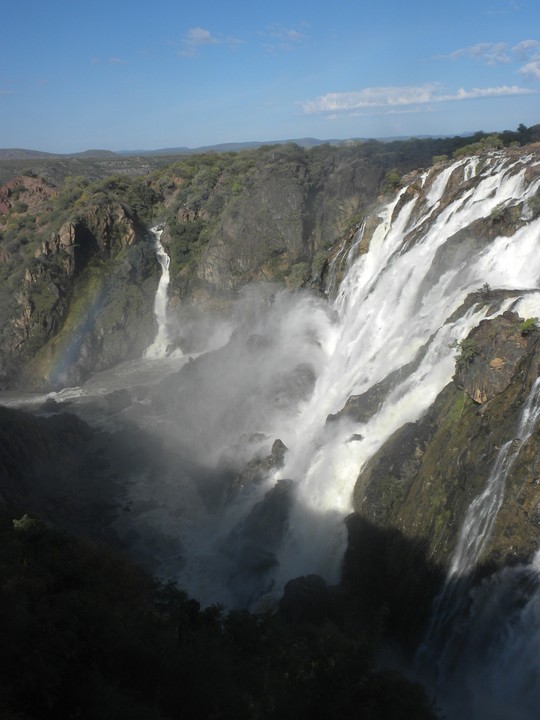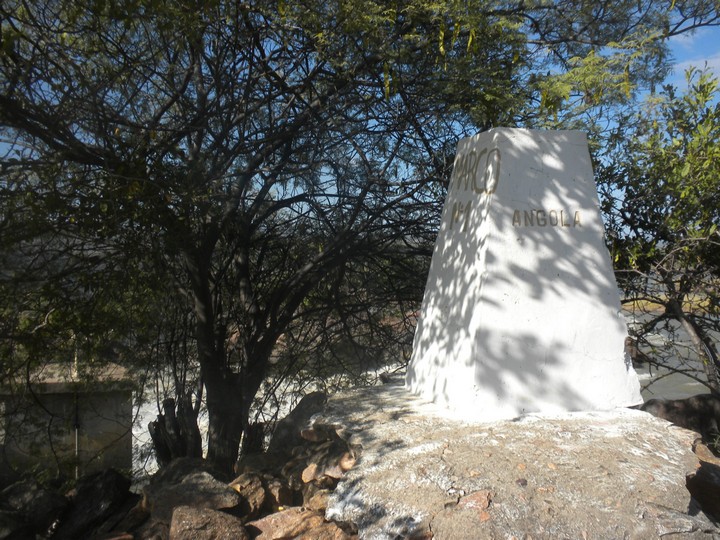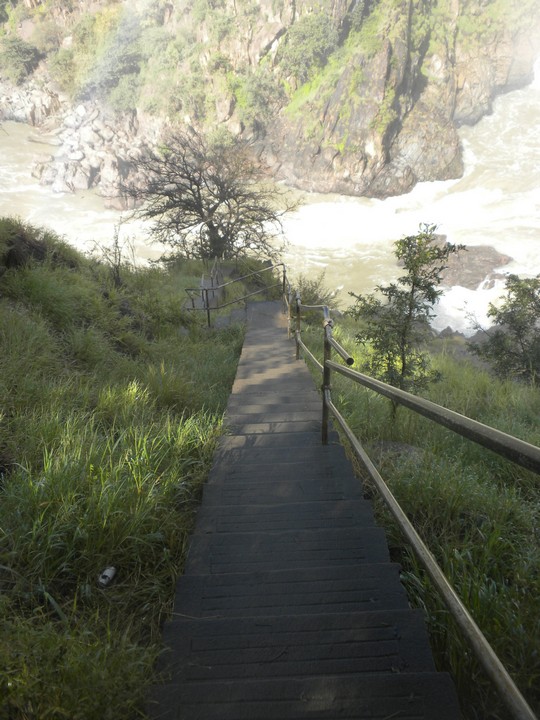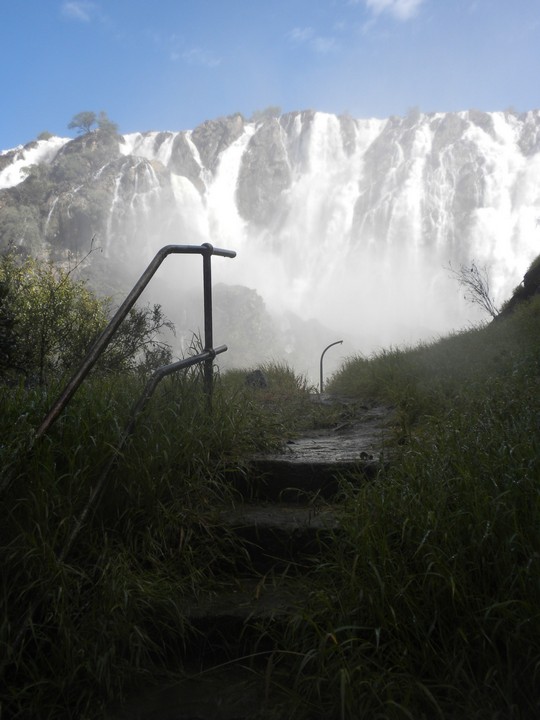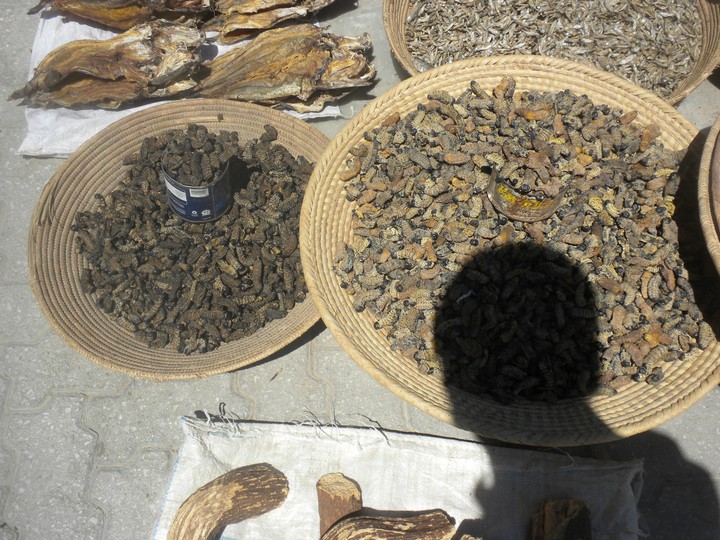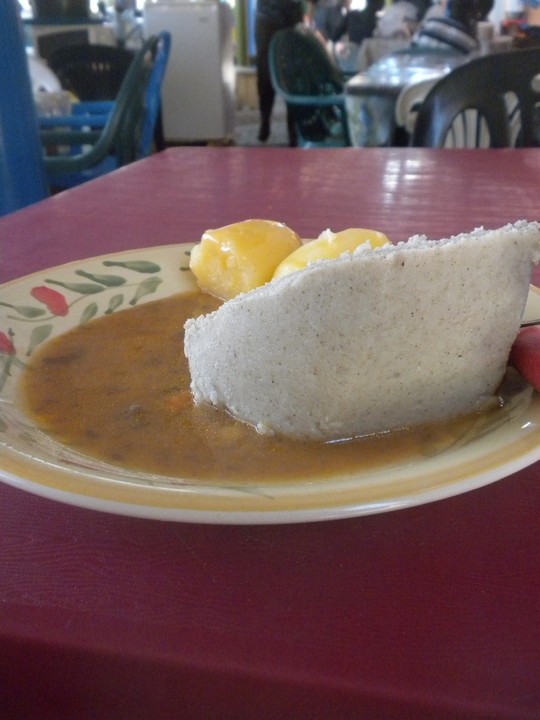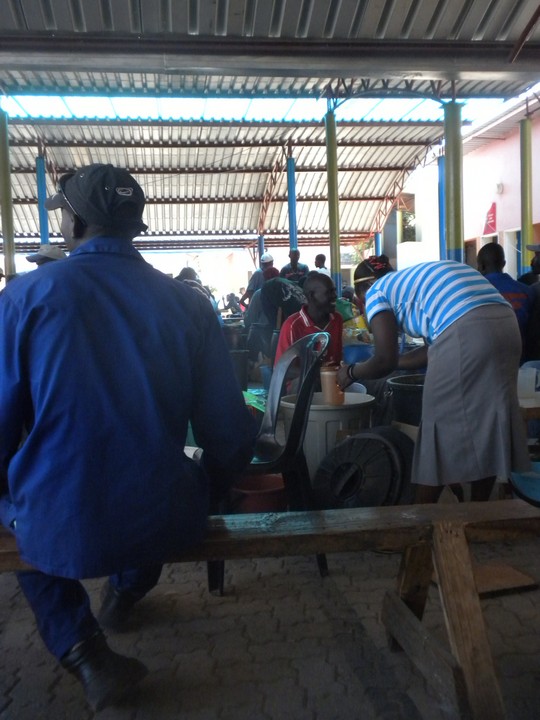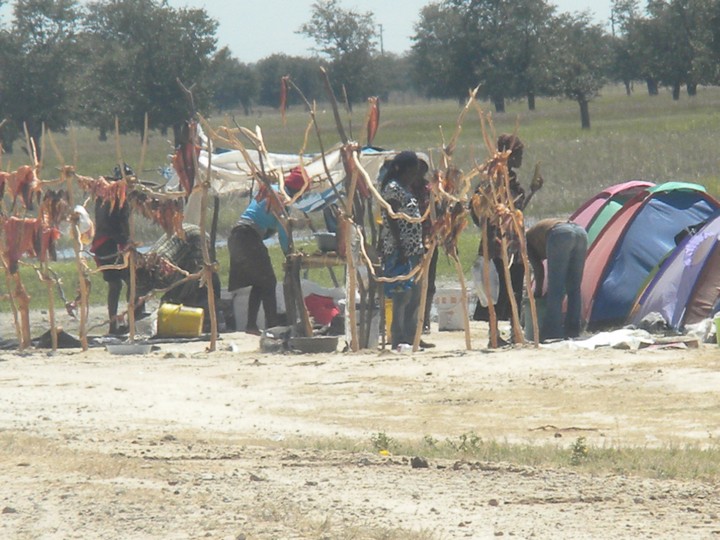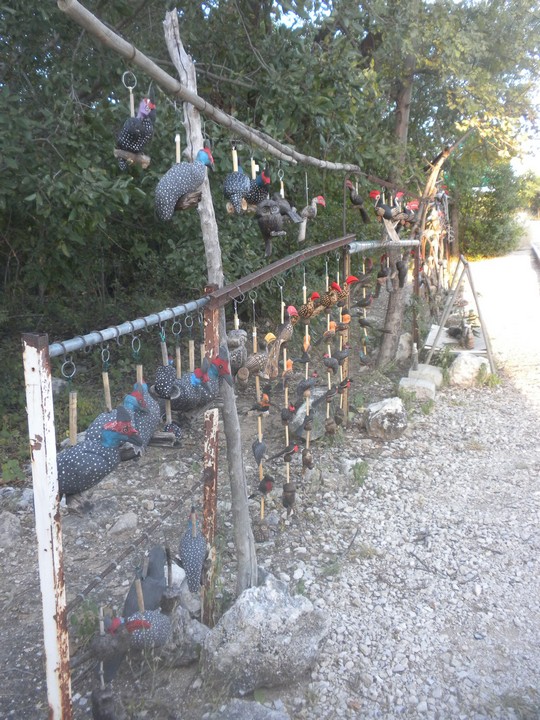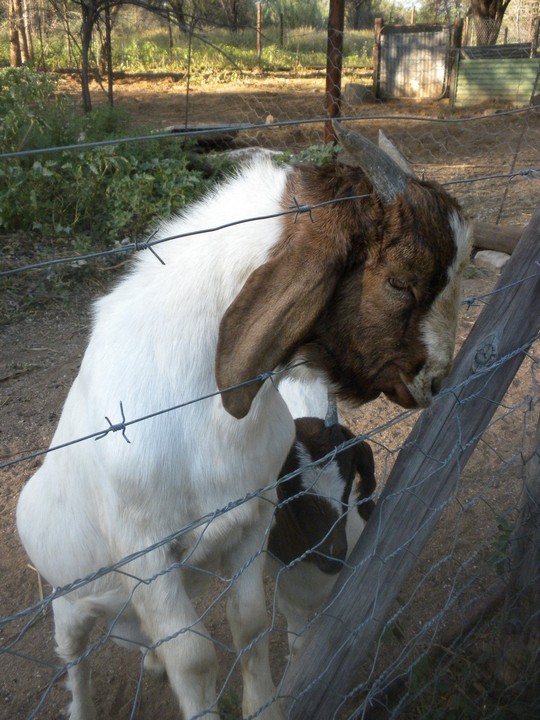
Unlike in the desert, most people in the city don't wake up an hour before dawn, and meandering through the quiet, misty streets yielded little reward. As the shops opened, we re-upped on groceries, picked up a Namibian sim card, and shelled out 20R for a mere half hour of internet. We hit up a service station on the way out of town and found that it was conveniently staffed by a bunch of motorcycle fanatics who delighted in helping us piece back together our bikes. With a small army of 'workies' (black mechanics) under their command, they got our chains lubed, our oil switched out, our filters cleaned, my light assembly repaired, and my speedometer cable welded back together. No fee was ever discussed; we gave the workies some apples.
It was an easy, boring few hundred kilometers to Omaruru where we found a rest camp for 80R per person. Fearful of braving the nighttime lows with his nearly worthless 25 degree Celcius sleeping bag, Matt requested a blanket. Since it was the night before Easter and they had extra rooms, the beneficent owner upgraded our camping spot to a room with three beds. I rode into town to survey the local churches and stopped at the supermarket to grab some dinner fixings; I thought long and hard about picking up some meats for the braai, but settled on some pasta, curried vegetables, and a carton of banana-flavored corn drink. As I sat drinking from my carton in the parking lot, another man, also drinking corn drink from a carton, walked up and toasted me. This was a magical culture-bridging moment if ever I've experienced one.
The rest camp doubled as the local watering hold and we dropped in to the bar to have a couple beers with the locals. We learned a lot about the Afrikaans and German cultures that intermingle in the Namibian bush and how it relates to preferences on beer and women. At one point in the evening, a diplomat who apparently handled relations with Angola, randomly appeared and bought us all a round, then promptly vanished. We met a girl who had graduated from UF a few years before and was now a Peace Corps volunteer in the neighboring township. Even in the backwoods of Namibia, there's no escape from the Gator Nation!

We waited around camp til 9 and accompanied a family living at the rest camp to Easter service at a local church. It seemed likely that none of them particularly wanted to go, but the father's brother-in-law was the preacher and there seemed to be little choice in the matter. It was a wonderfully awkward little service in a municipal building of the neighboring township; the majority of locals and American Peace Corps volunteers headed to a more legit-looking church with bells and a steeple down the street. Our preacher had a woman translate his sermon into English as he delivered it in Afrikaans, but she floundered on many of his words and he was constantly correcting her. The fluidity of the message left something to be desired.
Back at camp, we spent some time talking to a 14-year-old about his favorite massively multiplayer games, then set out for Outjo. Reaching that town, we found it to be something of a tourist stopover and we were immediately mobbed by aggressive souvenir nut sellers. Their game was to ask for your name, then carve it into intricately pre-decorated nuts in the hopes that you would feel compelled to buy them. One man, after a brief interval, triumphantly presented me a nut reading "Feff", but was immediately chastised by his companions who realized his blunder. We went to a nearby touristy restaurant and, since we were too cheap to buy individual meals, split a plate of eland stew, rice, purple cabbage and carrot cake for 50R; the owner was surprisingly accommodating and gave us separate plates with our portions, each prepared with the same flair as if we hadn't been acting like complete bums.
We drove towards Kamanjab and were soon dismayed to see a vast curtain of rain before us, the first we had seen since we left Cape Town. We rejoiced as the road curved towards a sunny, clear spot, then cringed as it swung back into the worst of the storm; when it seemed I was shooting for a passing gap, I would accelerate in order to catch it, and throttle back when I believed I was heading for the thick of it. Some forty kilometers after we had first sighted the storm, it hit us, soaking through our pitiful soft shells in a matter of seconds. Fortunately it subsided in a few minutes and left us only moderately chilled. After a few baboon and oryx encounters, we made into Kamanjab and to the Oppi Koppi Rest House, where we were greeted by a rambunctious springbok that believed for all the world that it was a dog.
We had been told several times that we should be negotiating the price of camping and I went into reception prepared to put up a fight, but the owner took one look at our bikes and announced that our site was free. We could stay as long as we wanted as long as we 1) occasionally bought something from the bar and 2) posed for a picture to be featured in the Book of Overlanders. Ours were by far the wimpiest vehicles in the book; there were a number of high cc dirt bikes, but most had arrived with massive converted dump trucks.
We went to the restaurant and opted to split the Easter dinner (Matt nixed the zebra steak). The dinner included salad, mashed potatoes, chicken stroganoff, squash, and pineapple cake, and was across the board one of the most delicious things I have ever eaten.

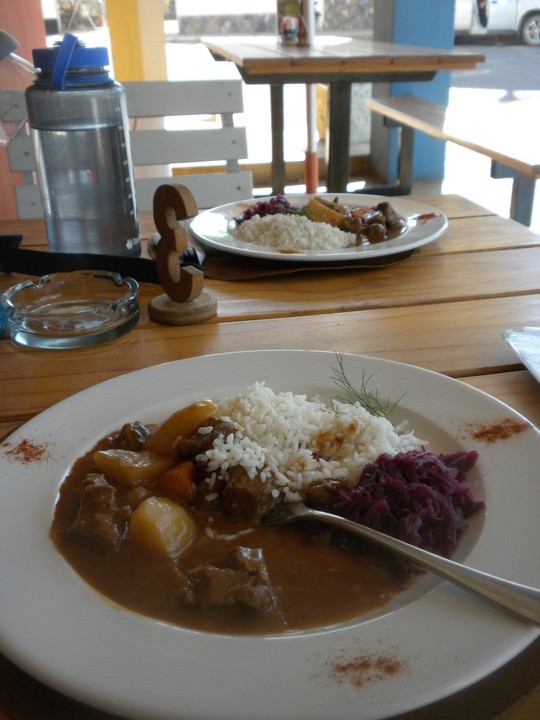
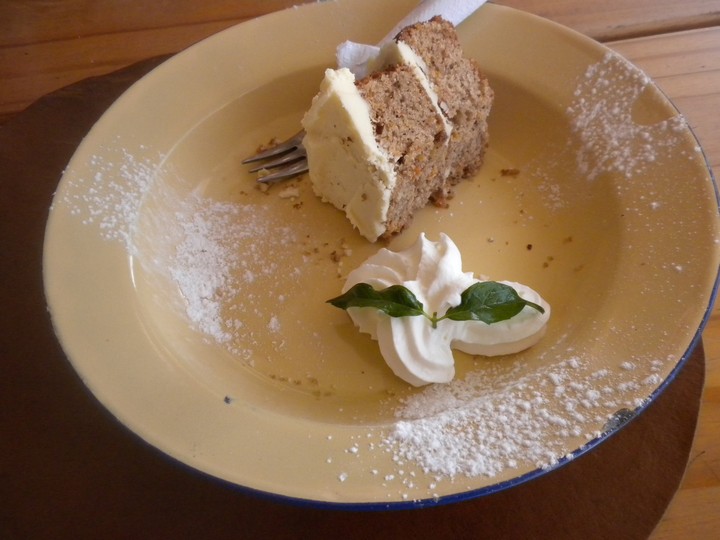

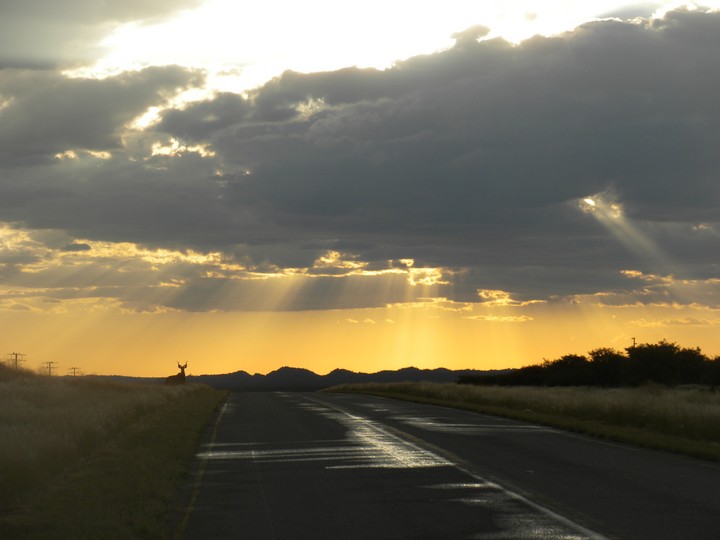
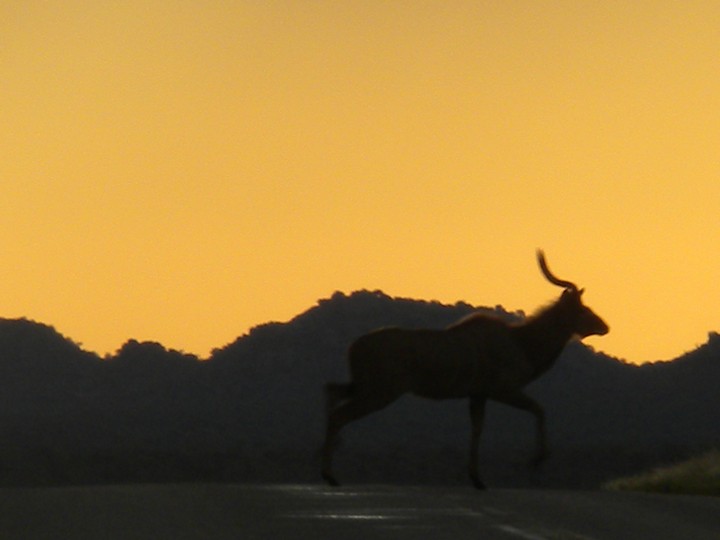
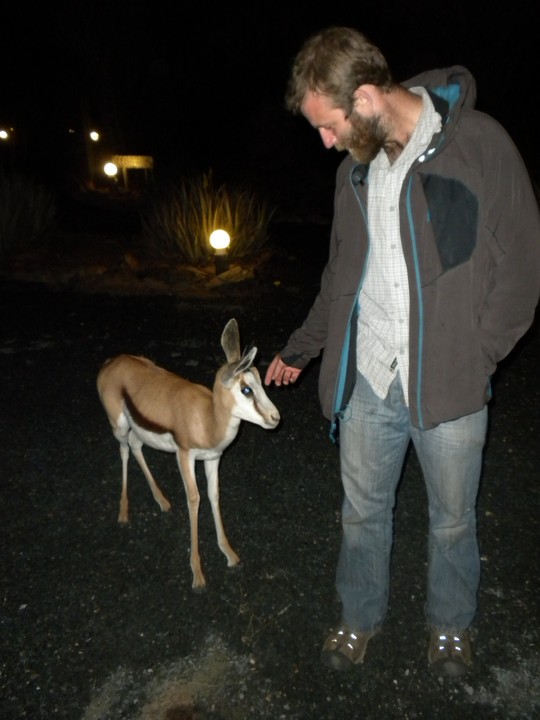
We called up Festus, the Himba school principal, and arranged to meet him in Opuwo at 4. As we headed north, it finally felt as if we were getting away from rural Texas and moving into real Africa - people were selling food from pots on the side of the road, and the predominant form of transport transitioned from riding in an air-conditioned landcruiser to sharing the bed of a truck with thirty people in funny hats.
There wasn't much to Opuwo beyond the forty different bars. We went to one of these and ordered Fantas and tried to fit in with the locals shooting pool and downing Windhoek Lagers. This didn't really work out, so we went to the selected rendezvous point to wait. Twenty minutes past the established meeting time, we called Festus and he told us he was half an hour out. We talked to a photographer from New Zealand who had been travelling for thirty years. He had all sorts of useful tidbits from his years of experience, such as "when walking at night in South America, carry two glass bottles; if a group of men approaches, smash the bottles against the nearest wall." He related a story about how he once got in a taxi and realized there were no door handles; immediately he strangled the driver and ordered him to stop right then and there. He also explained in great detail how to overland it straight through to Egypt; apparently you can get a Sudanese visa in 24 hours in Kampala, then hop on a boat up the White Nile in South Sudan and go north from there.
We called Festus around 5:30 and he said he would arrive in ten minutes. An hour later, right as the sun set, Festus pulled in with a truck full of people. We followed him around town for another half hour on horrendous 4wd roads as he dropped off all of his passengers. He did not seem at all sure of what he wanted to do with us and would stop from time to time and simply say "So, you want to see the Himbas", and nothing more. He had us buy twenty kilos of flour, sugar, and tea, as gifts for the village, which amounted to 120R. He debated for a time about whether he would proceed to the school that night or wait until early the next morning, and eventually decided that we would camp at his house. But then he proceeded to the bus stop and 40 kids jumped in the back of his truck; I rushed to protect the flour, sugar and tea that I imagined might soon be looted, or at the very least, stepped on. It turned out that these were his students and they were quite anxious to spend the night in their own beds at the school and not at the bus station. With much cajoling, he was finally convinced to leave for the village immediately. So we followed his truck full of singing students down a dark, sandy road. It was one of the worst we had ridden on thus far, and the cloud of dust kicked up the truck, coupled with our barely functional low beams, meant we could see next to nothing. We puttered along blindly, through deep sand and rock piles, weaving around invisible people and cows, and somehow survived the 30km, hour-long ride to the village. We set up our tent in a field full of giant sand spurs, and aside from occasionally being speared, or awoken by the loud braying of nearby donkeys, slept decently well.
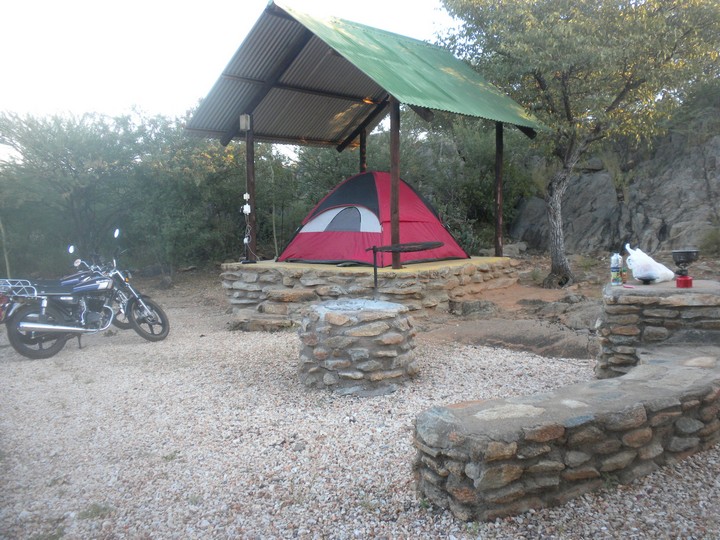
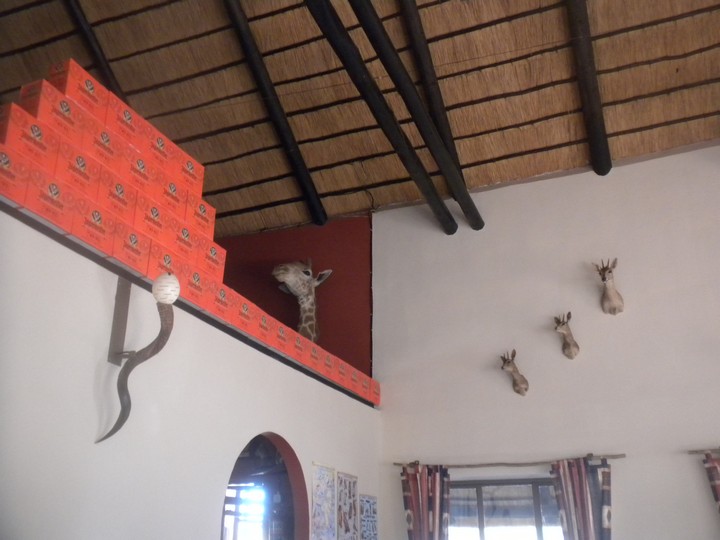
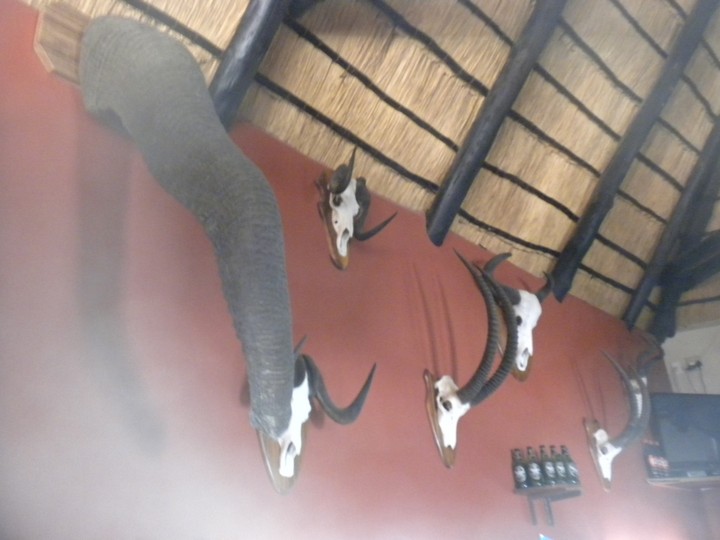
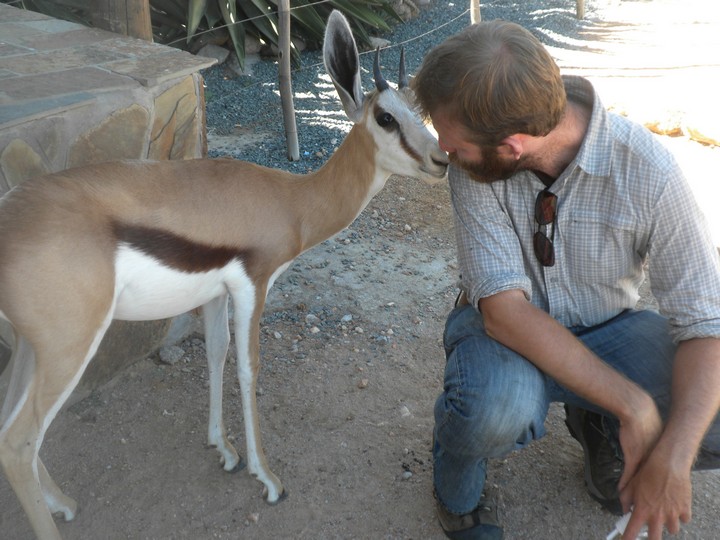
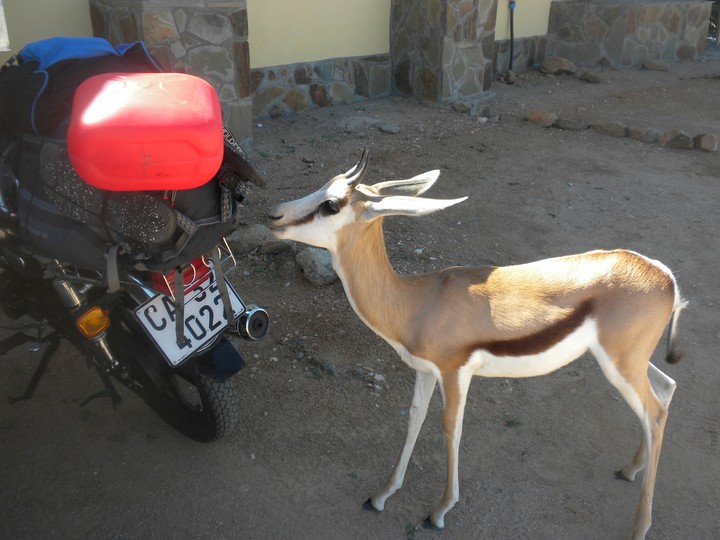
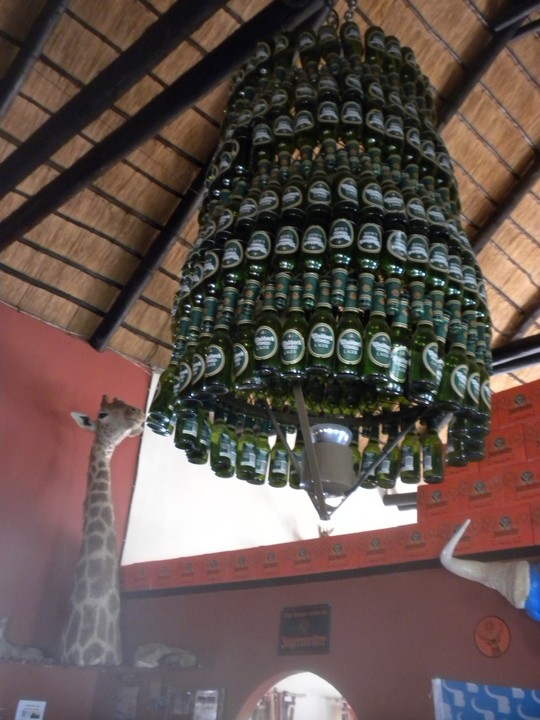
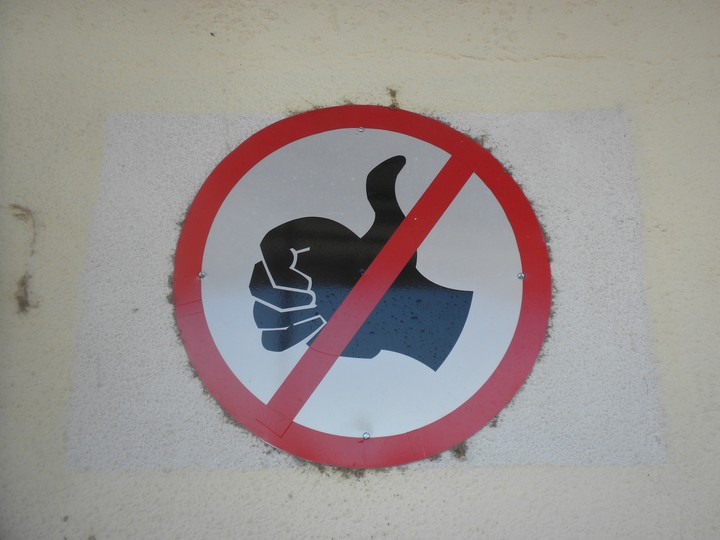
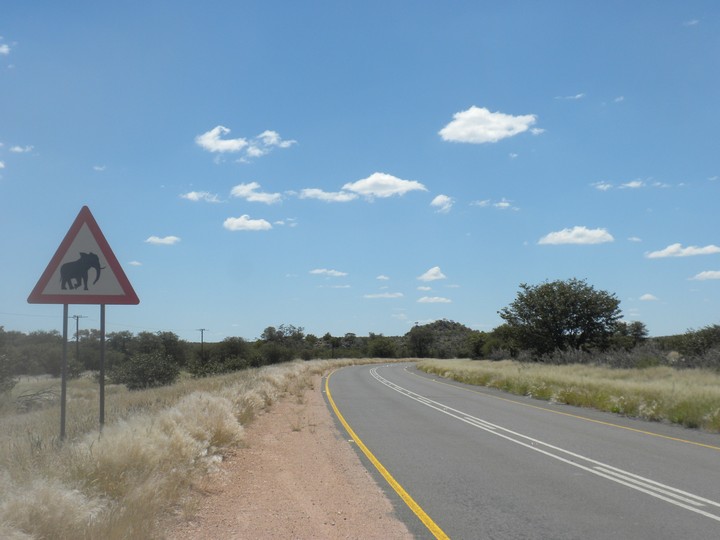

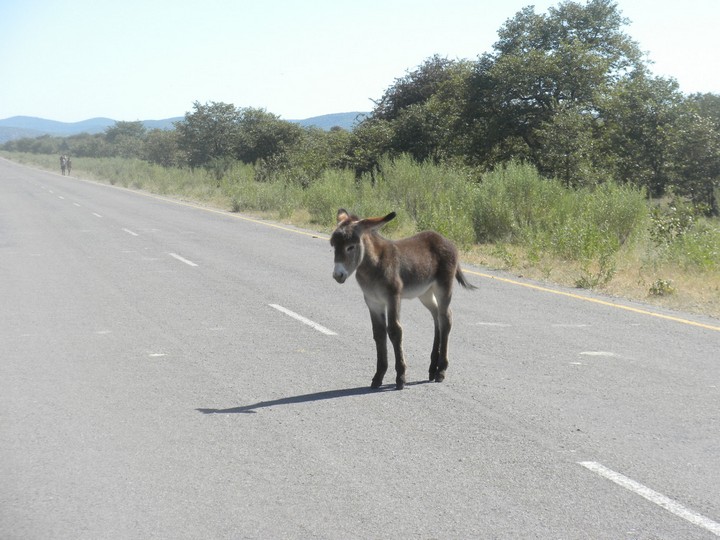



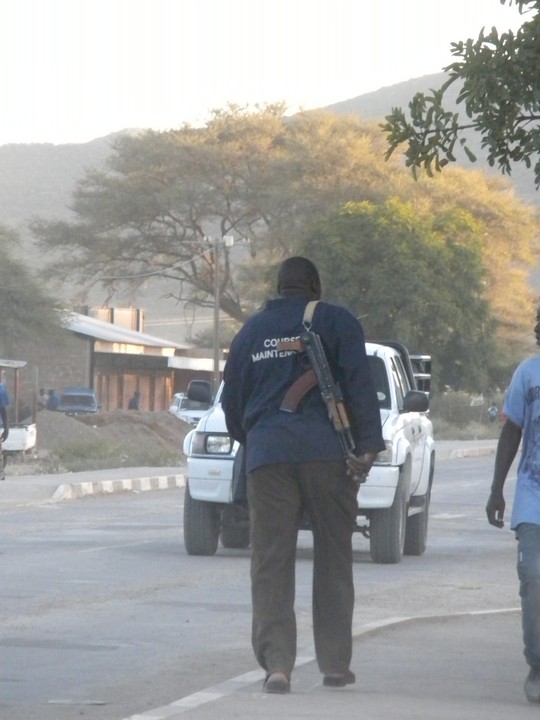
The principal seemed to think his students might have exams on the day after we arrived and it was therefore unlikely that we would be able to participate in classes. But this may very well have just been something he made up to keep us out of his hair, since nothing of the sort seemed to be happening and he equivocated on that point over the course of the day. School began at 7 but he asked us to remain at our tent until the first break at 10; we waited all of 5 minutes, then wandered into the schoolyard to soak in a typical Namibian school day. First the kids lined up in neat rows to sing a song and get a brief pep talk from Festus. Next, the kids milled around in the yard for twenty minutes, occasionally swarming to Matt and myself. They were called into their classrooms, but five minutes later were sent out to gather wood for the breakfast corn. Some gathered, while others mobbed the two of us - never saying anything, only smiling and staring expectantly, as if at any moment we might perform some amazing trick unique to white tourists. In a way, they were very much a mirror of ourselves, as we had no real purpose for being there and were only watching intently, waiting for something to surprise us.
After collecting a sufficient amount of wood, some of the students munched on ears of corn fresh off the fire, and afterward, returned to their classrooms to sit in silence and await the morning break. At the appointed time, we found Festus and helped him to organize his textbooks; across all grade levels, the school had about 15 for social studies. The books largely dealt with practical matters like farming, goat husbandry, and AIDs. The language of instruction was English, though it seemed only a few among the students had even the most basic understanding of it, but this likely was not too much of a problem as none of the teachers seemed to be teaching anything anyway.
Festus took us to meet the chief of the village across the way. We presented the aged chief with the flour, sugar and tea, and he asked us whether we had medicine for his cataracts or pain relievers for his back. We took off on a goodwill tour of the surrounding villages, and awkwardly waved to the woman and children who sat at their doorways, pondering why these strange white men were ambling by their houses. The Himba chapter of our southern Africa phrasebook only included five words, but through pantomime and the help of some young English students, we were able to deduce the names of all assembled, their ages, and the identify of a pile of hair and hooves in a nearby pot (it was goat). The most valuable cross-cultural exchange, however, happened when Matt whipped out his camera and a frenzy of modeling and performance arts ensued. First, a group of kids performed a local song and dance routine while another filmed it; when they subsequently requested that we show them one of our traditional songs, we were sadly stumped, and when we finally stumbled our way through "This Little Light of Mine", they just stared at us with blank expressions, neither the least bit impressed nor amused. Showing an aptitude for picking out the photogenic, they put three small babies on a donkey, and then requested that each of us, in turn, get on the donkey for a picture.
While the Himbas were quite adept at staying within the shade of their huts, we had spent much of our interaction exposed to the sun and, now quite enervated, quit our tour early and returned to our tent. Some kids showed up with a vintage road bike that clearly had no place in the sandy, thorn-covered desert, and asked that we inflate the tires. While we recognized the futility of it, Matt switched our pump to its presta setting and filled them; they would deflate again some few minutes later. We decided that the village probably wasn't the cultural treasure trove we had been led to believe it was and opted to pack up and leave that afternoon. The village access road was quite a bit better in the daylight, and we made it to the main highway and up to Rucana before nightfall. We were the sole campers at a luxury hotel (N$67pp) and borrowed a can opener from the kitchen so that we might prepare another delicious concoction of pasta and cabbage curry.





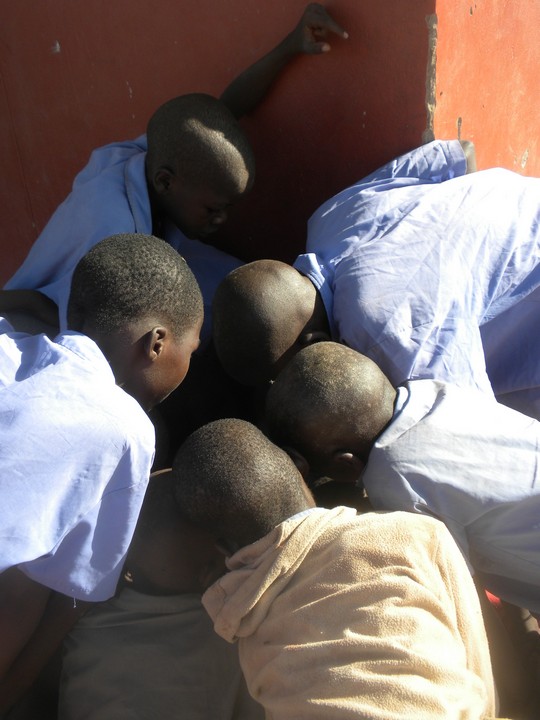
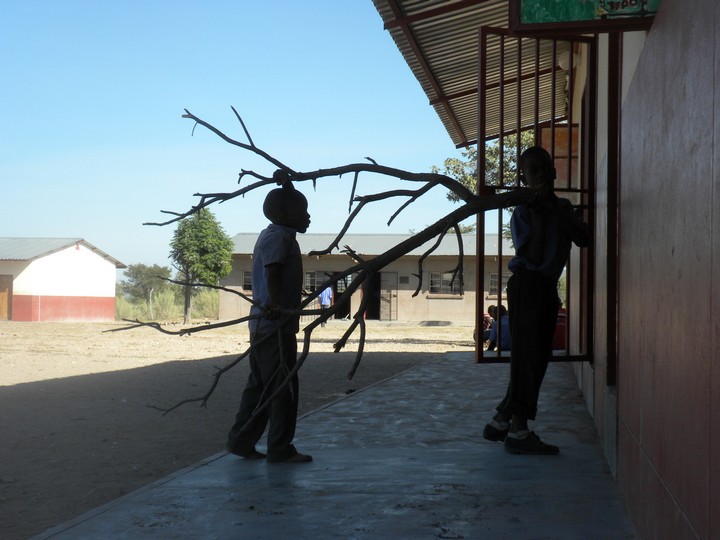
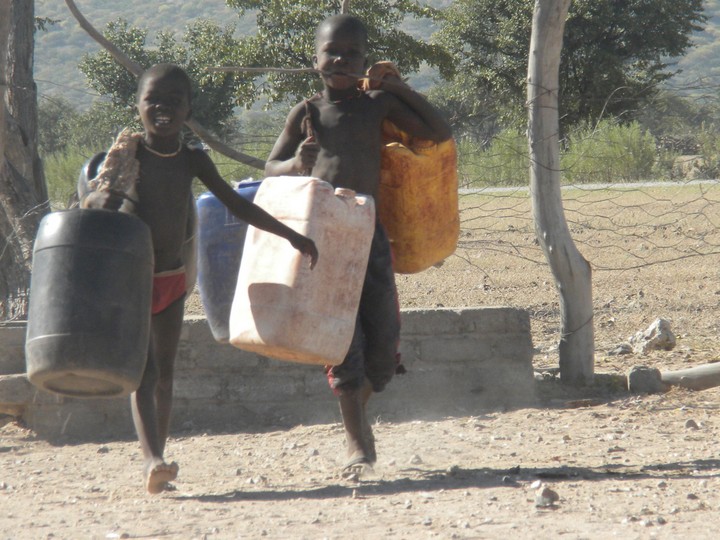

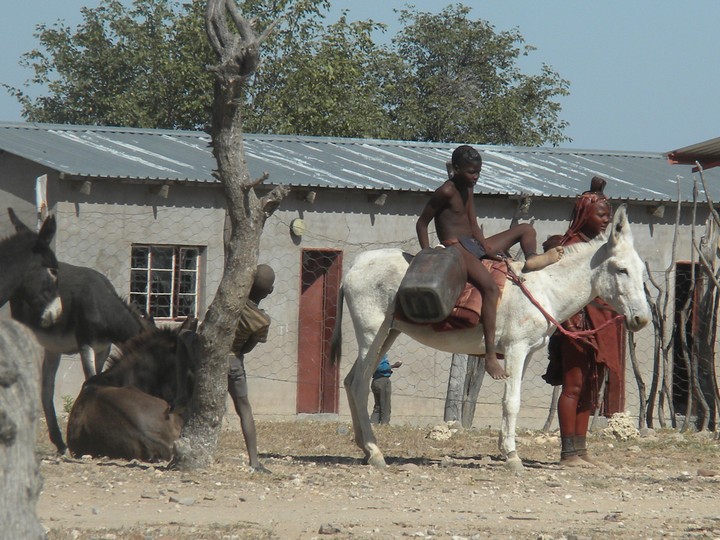
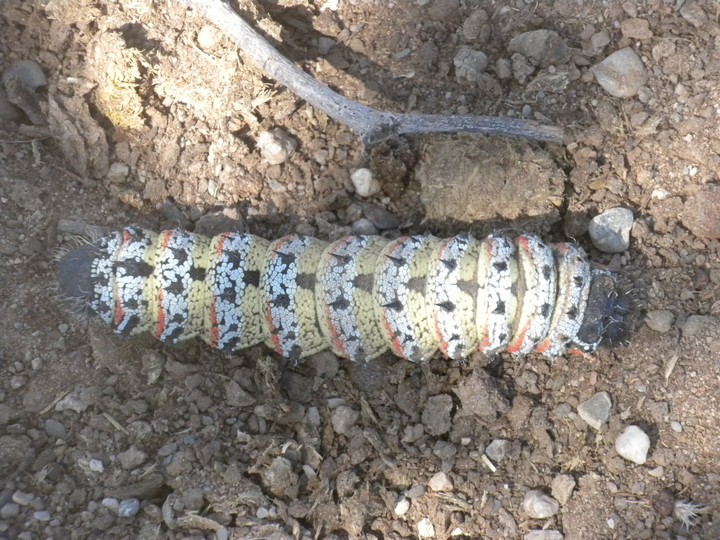

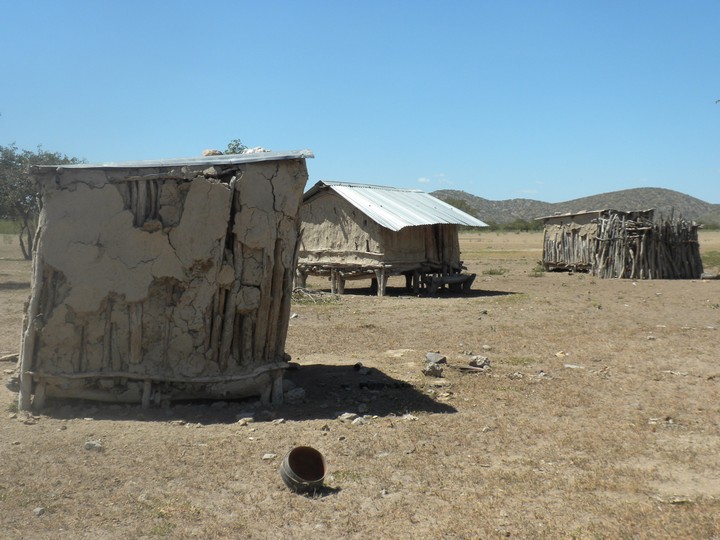
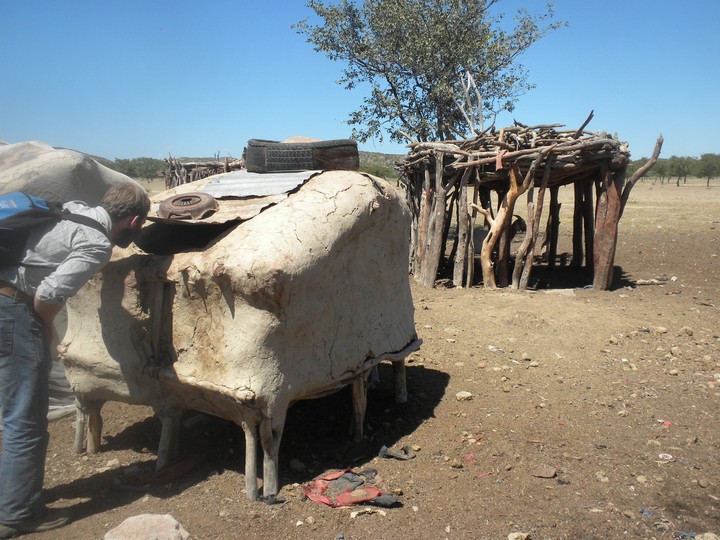






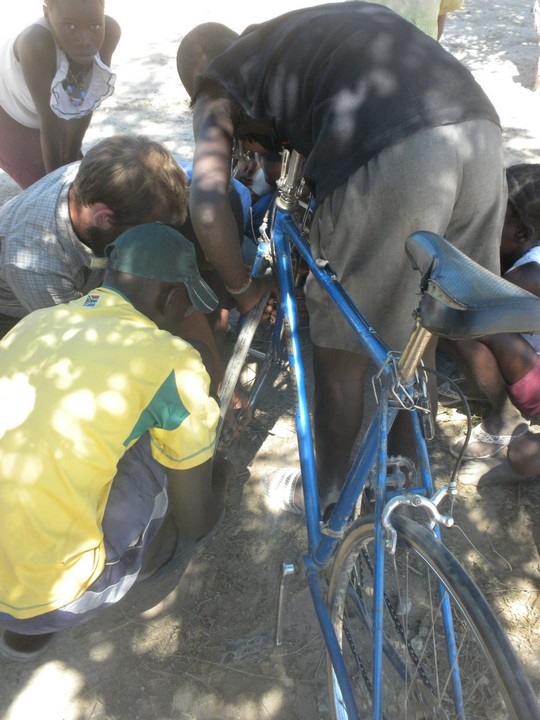
We followed a series of signs for Angola and Ruacana Falls until the road ended abruptly at a hydroelectric plant, where we were advised by the gate guard that the final turn was actually a completely unsigned narrow drive that dove down the hill a few hundred meters before. We asked the customs officials at the border post for a pass to see the falls, but they just nonchalantly waved us through. The parking area was in shambles and completely empty; we parked our bikes at the very front and walked through a gap in the trees, and immediately found ourselves with an exceptional, all-encompassing view of one of the most incredible waterfalls on earth. The full expanse of a double rainbow swept across a tropical paradise, where scores of colorful birds skimmed along the faces of several immense plumes of raging water. It was amazing. Its one critical flaw was its utter lack of any buildup whatsoever. There was no entrance fee, no crowds to push through, no souvenir hawkers, no multi-day boat trip and no jungly trail. You just stepped off your bike and through some trees and there it was. No matter how hard I tried, I could not bring myself to be adequately wowed; it was all just too easy.
Similarly easy was sneaking into Angola. A border fence led nearly to the edge of the rocky precipice that dropped into the falls, but conveniently stopped five feet short. We just walked around it and began exploring the exotic, forbidden land of Angola. The poorly maintained trails running through the Angolan jungle looked remarkably similar to some you might find in Namibia. We decided there might be some unfortunate consequences to arbitrarily wandering through Angola without a visa or an entrance stamp, so we resolved to go back. We were too lazy to walk all the way back to the falls, so we cautiously tapped the fence to check for a current, then scaled it and hopped down into Namibia.
We hiked down some crumbling stairs to the base of the falls, the handrail broken into pieces and hanging off in the void to one side. At the bottom, we found a disused pump house which was flooded but still contained much of the machinery to control the pumps. We eventually returned and were happy to find all of our stuff where we had left it, this being about the longest we had left our bikes unattended.
We drove to Outapi and visited a giant baobab tree that was used as a church, hideout for soldiers, post office and several other functions. Matt took a 30-minute tour of the single room for 20R while I went next door to explore the market. There I found the food I had been waiting for all trip - I got a heaping blob of corn paste, meat sauce, and potatoes for a dirt-cheap 7R. At the next stall over, a woman sold bush beer out of trash cans; this stuff went for 2R per liter, tasted remarkably similar to Kombucha, and, at 2% alcohol, would in fact get you drunk if you tried hard enough.
The road to Etosha was peppered with a plethora of police checkpoints. I always got the same question: "Why is your license expired?" Since America is the only country in the world that lists their dates month first, they universally perceived my expiration date and birthday to be February 8th. Sometimes the cops would stand in the middle of the road, making their intentions clear, other times they would sit on the side and wave you through, and still other times they would sit and do nothing at all; I perceived this latter inaction to mean it was safe to continue on; this was apparently not the case. After I ran one such stop, the police jumped in front of Matt and gave him hell for some minutes for my transgression. Interestingly, very few cops in Africa seem to have anything faster than a bicycle and thus have little recourse if you choose not to honor their stops.
We reached the gates of Etosha at 5:15; the exceedingly helpful ranger informed us that it was too late to hitch into the park that night, but we could pitch our tent for free in an overgrown picnic area just inside. The bathroom was rather defunct, but the taps still had running water. We used a tire lever to open a can of chakalaka (spicy cabbage) and mixed it with spaghetti. We talked to some children that wandered over; they informed us that a cheetah had frequented our campsite the last few nights. Matt watched YouTube music videos on the children's phones while I accessed an unsecured WiFi network that provided the speediest internet of the trip.


